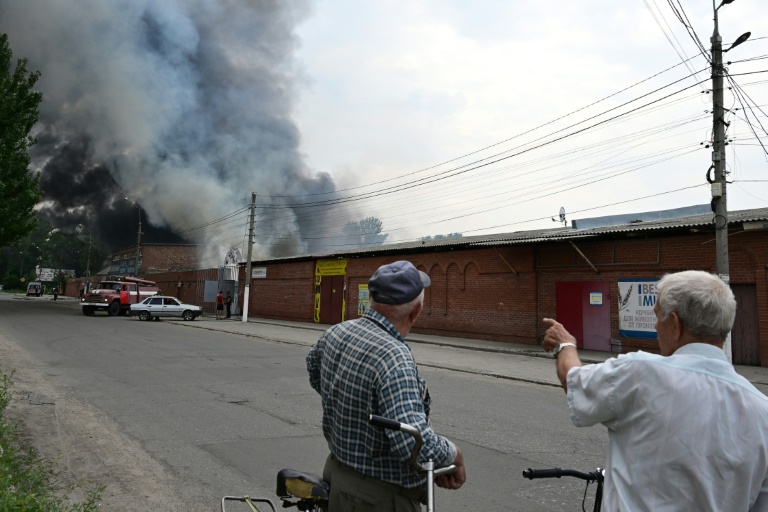Fighting raged on Tuesday in and around Ukraine’s eastern Donbas region as Russian troops tried to maintain a series of battlefield gains, while NATO pressed ahead with Finland and Sweden’s momentous membership bids.
Moscow’s forces — buoyed by seizing several cities in the Donbas in recent weeks — continued to press west, pounding their next key target, the city of Sloviansk, with “massive” shelling, the city’s mayor said.
At least two people were killed and seven others wounded in Russian strikes targeting its central market, following several days of similarly deadly bombing there.
AFP journalists on the ground saw rockets hit the marketplace and several adjacent streets, as firefighters scrambled to put out resulting fires in the city, which had a pre-war population of around 100,000.
Pavlo Kyrylenko, governor of the Donetsk region, which includes Sloviansk, accused Russia of “intentionally targeting places where civilians assemble”.
“This is terrorism pure and simple,” he said on Telegram.
In Moscow, the defence ministry reported that Russian forces had also targeted the northeastern city of Kharkiv with “high-precision” weapons over the past 24 hours, claiming to have killed up to 150 Ukrainian servicemen.
Several other regions were also hit with missiles and artillery, Kyiv reported.
Meanwhile, Russia said it was investigating the torture of Russian soldiers held prisoner in Ukraine that were recently released as part of a prisoner swap.
– ‘Timely’ –
In Brussels, NATO Secretary General Jens Stoltenberg and the foreign ministers of Sweden and Finland hailed Tuesday as “historic”, after they kicked off accession procedures for the two countries that will expand the military alliance to 32 members.
“The membership of both Finland and Sweden will not only contribute to our own security but to the collective security of the alliance,” said Finland’s Pekka Haavisto, after protocols were signed launching the required ratification process.
Sweden and Finland both announced their intention to drop decades of military non-alignment and become part of NATO in the wake of Russia invading Ukraine in February.
Ukrainian Defence Minister Oleksii Reznikov welcomed Tuesday’s “timely (and) correct” step, adding on Twitter: “Who will be next…?”
NATO offered Ukraine a path towards membership in 2008 but that stalled amid strong Russian opposition and has been further complicated by its invasion.
With the war well into its fifth month, Kyiv’s allies meeting in the Swiss city of Lugano committed Tuesday to supporting Ukraine through what is likely to be a lengthy and expensive eventual recovery.
Two days of talks involving representatives from some 40 countries agreed on the need for reforms to boost transparency and tackle corruption, as they heard rebuilding the war-ravaged country could cost at least $750 billion.
“Our work prepares for the time after the war even as the war is still raging,” said Swiss President and co-host Ignazio Cassis.
– ‘Full alert’ –
After abandoning its initial war aim of capturing Kyiv following tough Ukrainian resistance, Russia has since focused its efforts on securing control of the Donbas.
The region is mainly comprised of Lugansk, which Russian forces have almost entirely captured, and Donetsk to its southwest, which they are now concentrating on seizing in full.
In a sign Moscow was trying to consolidate supply lines for its ongoing push, Ukraine’s armed forces said Russian troops in Lugansk were “taking measures” to restore transport infrastructure behind the fighting lines.
The fall of Lysychansk on Sunday, a week after the Ukrainian army also retreated from the neighbouring city of Severodonetsk, has freed them up to advance on Kramatorsk and Sloviansk in Donetsk.
On Tuesday, they were first closing in on the smaller city of Siversk — which lies between Lysychansk and Sloviansk — after days of shelling there.
Two Ukrainian Red Cross minibuses were heading there to evacuate willing civilians, according to AFP reporters.
To the southwest, in the Moscow-occupied Kherson region, Russia’s troops were deploying helicopters and various artillery to try to stem Ukrainian counter-attacks.
The intensifying battles there come as Kremlin-installed authorities in Kherson announced that an official from Russia’s powerful FSB security services had taken over control of the regional government there.
Kherson city, which lies close to Moscow-annexed Crimea, was the first major city to fall to Russian forces in February, and has seen a campaign of so-called Russification since.
A spokesman for Ukraine’s defence ministry said Tuesday Russian forces outside the Donbas were “trying to bind our troops in order to prevent them from moving to the battle areas”.
“It keeps us… on full alert all along the front line,” he told the Ukrinform news agency.
Meanwhile, appearing by video Tuesday at an annual forum hosted by The Economist magazine, Ukrainian President Volodymyr Zelensky predicted Russian ally Belarus would not be drawn into the war.
But he warned “provocations” by its northern neighbour were likely to continue.
Belarusian leader Alexander Lukashenko on Saturday accused Ukrainian forces of firing missiles at his country.










